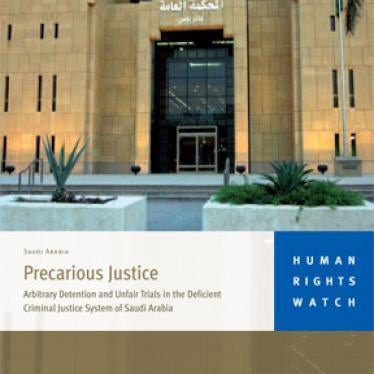(Beirut) – The Supreme Court of Saudi Arabia should void a sentence to amputate the hands and feet of six stateless people convicted of armed robbery, Human Rights Watch said today in a letter to the Saudi Human Rights Commission. The sentence constitutes internationally prohibited torture.
Human Rights Watch urged the Saudi Human Rights Commission to press for a retrial and a voiding of the sentence.
“Cutting off someone’s hands and feet is torture, plain and simple,” said Christoph Wilcke, senior Middle East researcher at Human Rights Watch. “Judicially sanctioned torture is abhorrent, and this verdict, if confirmed, would bespeak a state policy of torture.” The family of ‘Amir ‘Iyada, one of those convicted, learned in early December, 2011, that the Court of Cassation had confirmed the verdict of amputation issued by Riyadh’s General Court in January. The Supreme Court, which has not yet reviewed the case, provides the final judicial review. Under Saudi law, the king may not grant a pardon to cases of hiraba, or armed robbery, considered a crime against God under Saudi interpretation of Sharia law.
Judge Abd al-‘Aziz Al al-Shaikh of Riyadh’s General Court tried ‘Iyada and his co-defendants in only two court sessions, each lasting less than one hour, and prohibited them from appointing lawyers to assist them in their defense, ‘Iyada told Human Rights Watch. ‘Iyada’s family-appointed lawyer prepared his written appeal, but was not allowed to meet with his client, attend court sessions, or see documents except for the public verdict.
‘Iyada told Human Rights Watch that four officials of Riyadh’s criminal investigation department tortured him over the course of 10 days after his arrest in mid-October 2010, to force him to confess.
“They beat me with their hands, electrical cables, and sticks all over my body, for hours on end, every day,” ‘Iyada said.
A judge authenticated ‘Iyada’s confession even though ‘Iyada stood before him with marks of torture visible on his face, ‘Iyada said. Judge Al al-Shaikh convicted the defendants despite noting in the verdict that they had withdrawn their confessions on the grounds that they had been coerced. No investigation into allegations of torture has taken place, to Human Rights Watch’s knowledge.
The written verdict states that ‘Iyada and five other stateless persons, who came from Iraq and Syria, carried out an armed robbery on October 9, 2010, against three employees of a supermarket chain as they were transporting the week’s proceeds of over $1 million to the bank. No one was harmed in the robbery.
‘Iyada contends that the events and his role in them were significantly different from those described in the court verdict.
“Police and judges seem to be a torture double act, with the police torturing suspects to confess, and judges pronouncing sentences that amount to additional torture,” Wilcke said. “The court’s verdict and sentence, if upheld and carried out, would undermine any claims of Saudi Arabia regarding its progress in criminal justice reforms.”
Sharia law in criminal cases remains uncodified in Saudi Arabia, leaving judges wide discretion to classify certain acts as crimes and to set punishments. Human Rights Watch is aware of four cases of hand amputations carried out in Saudi Arabia over the past decade, though none for armed robbery.
Human Rights Watch asked the Saudi Human Rights Commission to assign ‘Iyada and the others a competent lawyer, as the commission has done in other cases, to request a retrial of ‘Iyada and his five co-defendants, and to denounce publicly the punishment imposed as unlawful torture. Human Rights Watch also asked the commission to visit ‘Iyada and the other defendants in Malaz prison regularly and frequently, to ensure that they suffer no adverse consequences from the publicity of their case.






